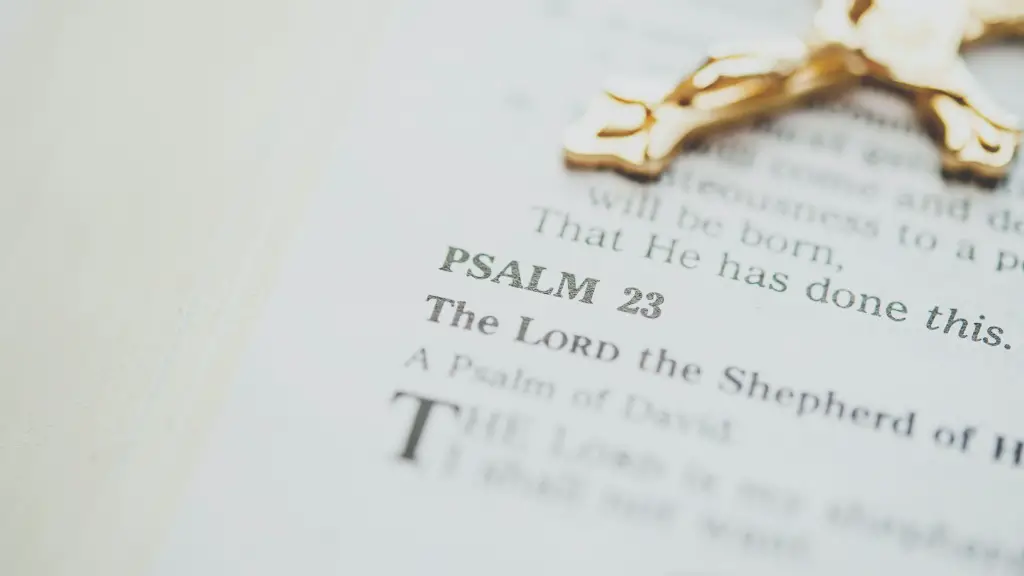Biblical Interpretation
The Bible has a few passages that address when life begins, yet they may be interpreted differently depending on religious ideology. Genesis 2:7 states that ‘God formed man out of the dust of the ground and breathed into his nostrils the breath of life and man became a living being’. This is the classic ‘creation’ interpretation which posits that life only begins at the moment of physical birth. According to this view, souls only exist after birth and the fetus is not a living being.
However some Christians believe that life begins at conception. Psalm 139:13-16 reads ‘you made all the delicate, inner parts of my body and knit me together in my mother’s womb.’ This passage is taken to suggest that God has a relationship with the unborn child and that life starts at the moment of conception.
Religious Scholars’ Views
Religious scholars, theologians and other experts disagree on when life begins according to the Bible. Some scholars believe that life starts after the baby is born while others hold that it begins at conception. For instance, the Pontifical Academy for Life at the Vatican argues that life begins at the moment of fertilization, while other religious scholars such as Robert Miller, a professor at the Candler School of Theology, says that life begins at birth.
There are also those who believe that life is a process that continues until birth, therefore suggesting that life begins at conception. These theologians suggest that the fetus is ‘developed enough’ to be considered a life form from the moment of conception.
Informed Decisions
The Bible does not provide a clear-cut answer on when life begins, leaving much for the individual to decide. People will have to base their decisions on what they believe the Bible meant when it spoke about the ‘breath of life’ and ‘becoming a living being’.
People can also look to the public policy surrounding abortion. Abortions are still legal in most countries and in the U.S., abortion is allowed during the first trimester of pregnancy. This suggests that according to some interpretations, life begins after the first trimester or after birth.
Bioethical Analysis
Bioethicists, or professionals who study the ethical implications of medical treatments and procedures, are divided on when life begins in the Bible. According to bioethicist Dr. John Kilner, ‘The exact moment when life begins is a matter of dispute and the Bible does not provide a clear answer.’ He argues that the Bible’s teachings are not clear cut and should not be used to make decisions about when life begins.
Dr. Holly Leiser, an ethicist at the East Carolina University School of Medicine, believes that life begins at the moment of conception. She states that ‘from a bioethical perspective, we must acknowledge that life begins at conception and that every unborn child is a unique human person with their own rights, needs, and potential.’
Theological Perspective
Theologian John Stott argues that ‘most Christians today accept the natural law idea that human life begins at conception.’ He believes that this view is supported by the Bible’s message of love and respect for life, as well as by the fact that the fetus has the potential to become a human being. Stott’s views echo what James Dobson, a Christian author and radio host, has stated about when life begins. Dobson writes ‘In my view, the scientific evidence strongly supports the belief that human life begins at conception.’
Secular View
Non-religious individuals have varying opinions on when life begins, which may be informed by society’s views on human rights and science. Those who take a secular view on the issue may state that life begins at conception because the fetus already has many of the capabilities that are associated with being alive, such as the ability to feel, grow, and survive in the womb. Others may argue that life begins at birth, since this is the point at which the fetus can actually survive outside the womb.
Ethical and Moral Considerations
The debate surrounding when life begins according to the Bible is important, since it influences and shapes attitudes towards abortion and other ethical issues. Pro-life advocates often point to biblical passages that suggest life begins at conception, and therefore use these to argue that abortion should be illegal. On the other hand, those who take a pro-choice stance tend to focus on passages that suggest life begins at birth, and use this to argue that abortions should not be criminalized.
The discussion around when life begins also has an effect on individuals’ moral beliefs. While some take a strong stance towards their religious beliefs and agree that life begins at conception, others may choose to take a more open-minded approach and accept that various interpretations may exist.
Health Implications
The decision on when life begins according to the Bible also has a big impact on healthcare and medical treatments. For instance, fetal tissue is a valuable resource that is used in stem cell research. Thus, if life is seen to begin at conception, then the uses of fetal tissue in medicine and scientific research could be seen as unethical.
Similarly, if life is seen to begin after birth, then this could have an impact on access to healthcare for pregnant women and newborn babies. This is because many countries focus their healthcare investments on the elderly and those with chronic illness. It may be seen as unethical to deny care to pregnant women and newborns if life is seen to begin at birth.
Conclusion
The debate around when life begins according to the Bible is not one-dimensional as it has far-reaching implications for ethical and moral decisions. People are left to grapple with interpreting biblical passages and interpreting them in light of modern day issues such as abortion, fetal tissue treatments, and access to healthcare. Ultimately, what matters is how each person chooses to come to their own conclusion on when life begins according to the Bible.


